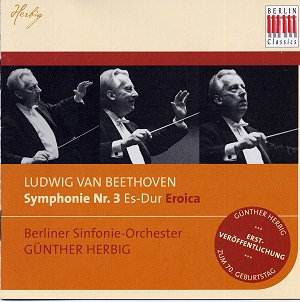This release commemorates Günther Herbigís seventieth
birthday and the liner notes go into some detail about his career at
the time the recording was made in 1982. The orchestra is the fine Berlin
Symphony, the band set up with East German state funding in 1952 to
try to compete with the Philharmonic over in the west part of the old
divided city and the studio used is the mellow and spacious Christuskirche.
Herbig was Chief Conductor of the orchestra at the time and all seemed
well. Within a year, however, he would emigrate from the old East Germany
and build a career in the west, intrigued out of his job by the bureaucrats
in the GDR.
Herbig is one of those craftsmen German conductors
for whom the word "dependable" might have been invented. But
please donít think that I use the word in any pejorative sense, quite
the opposite. It is the case with some actors that you know as soon
as they come on stage that everything is going to be right. They have
clearly learned their parts to the last word and the performance they
give will be solid and secure and you will be able to relax and let
them entertain you. The same applies to some conductors, especially
of the central German repertoire of which this symphony is central to
it and Herbig is certainly one of those conductors. Hans Schmidt-Isserstedt
was another and so too was the recently deceased Günter Wand. In
fact I think Herbig has been quite badly overlooked in the pantheon
of modern day masters of the baton. Not as flashy as some of his colleagues,
not as media friendly, just a great musician with artistic depth which
can often not count for as much as it should these days. Maybe that
will change, as he is still very active.
One conductor once said that if you can get the first
movement of the "Eroica" right you should be able to get right
everything else right in the same repertoire. Herbigís performance of
the first movement is an excellent example of balanced force exquisitely
applied in all the right areas. It moves along with great energy and
verve and yet never is there a feeling that we are being rushed. There
is balance at all times too and some imperceptible relaxation of tempo
in the valleys of the movement but the effect of the symphonic pull
is maintained. By the immense coda, surely one of the great passages
in all symphonic movement, Herbig has built up a real head of steam
and the orchestra is with him all the way. The funeral march carries
on in much the same vein though the tension relaxes enough for us to
know we are in different territory. There is the correct amount of grieving
but this is elegy rather than requiem and an elegy for a man of action
conveyed by the way that the movement takes off in the central fugue,
thrusting and powerful. This passage, always key to reading a performance,
is an argued and forceful essay in the dramatic. These players clearly
know this man well and obviously want to play well for him. Then in
the Scherzo Herbig adopts a wonderfully rubicund and genial air for
the horn led Trio. In the Scherzo proper notice also the fine string
playing and the spacious recording playing its part too.
Herbig would record the "Eroica" again in
the studio in 1994 with the Royal Philharmonic for their short-lived
Royal Philharmonic Collection on the Tring bargain label. That was not
in the catalogue long which was a pity because it was a performance
I liked. I was pleased, therefore, when this earlier recording arrived.
What is interesting, however, is the fact that Herbig seems to have
confounded an old dictum that as conductors get older tempi get slower.
Overall this 1982 recording of the "Eroica" is over two minutes
slower than the one he made twelve years later and is none the worse
for that. This does also represent what we might still refer to as "big
band Beethoven", so not for Herbig any of the recent authentic
practice touches. But if you expect the last movement to lack any sense
of direction, to meander and dissipate its essential energy and humour
in any way, then you would be mistaken. What you get maintains the mood
of the previous movements and yet fulfils the device of transformation
out of tragedy Beethoven clearly meant to convey by the end. From the
opening, played "attacca", as it would be in the later RPO
recording, Herbig manages to move through the Prometheus variations
with a lovely sense of poise and style. Humour may not be high on his
menu but he certainly has lightened the mood sufficiently to convey
the overall effect of this remarkable work. The late, horn-led delivery
of the theme has fine grandeur and the coda is winning. Rounding off
a studio performance that gives every impression of being a "live"
one and which will give you much pleasure as it did me
A rich, vibrant performance by a neglected craftsman.
Happy birthday, Günther Herbig.
Tony Duggan
.


